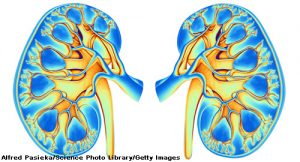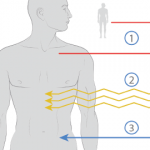 Although in the short term, patients with systemic lupus erythematosus (SLE) benefit from renal transplant similarly to patients without SLE, long-term prognosis similarities between the two populations are less obvious. Moreover, studies indicate the clinical response of SLE patients to transplantation can depend on ethnicity, socioeconomic status, donor-related factors and lupus nephritis recurrence. Despite the controversy over long-term outcomes, nephrologists agree lupus nephritis patients undergoing dialysis should be listed for transplantation as early as possible, even in the presence of active SLE. Some specialists also suggest that because the risk of SLE is heritable, SLE patients may benefit from a transplant from a deceased, unrelated donor as opposed to a living related donor.
Although in the short term, patients with systemic lupus erythematosus (SLE) benefit from renal transplant similarly to patients without SLE, long-term prognosis similarities between the two populations are less obvious. Moreover, studies indicate the clinical response of SLE patients to transplantation can depend on ethnicity, socioeconomic status, donor-related factors and lupus nephritis recurrence. Despite the controversy over long-term outcomes, nephrologists agree lupus nephritis patients undergoing dialysis should be listed for transplantation as early as possible, even in the presence of active SLE. Some specialists also suggest that because the risk of SLE is heritable, SLE patients may benefit from a transplant from a deceased, unrelated donor as opposed to a living related donor.
New research suggests lupus nephritis patients in Brazil who received renal transplant do, indeed, have a high five-year survival rate. Moreover, the investigators found the presence of antiphospholipid syndrome (APS) was an important predictor of graft loss. The research by Bruna Coelho Albuquerque, a graduate student at the University of Fortaleza, Brazil, and colleagues was published online Aug. 12 in Scientific Reports. This study is one of only three studies of renal transplant patients with SLE and lupus nephritis to be conducted in Brazil.
The investigators evaluated the clinical and epidemiological characteristics, graft survival time, patient survival and its determinants, and recurrence of SLE in a cohort of 38 lupus nephritis patients who received a transplant between 1996 and 2016. They compared their findings with the national and international literature. Their retrospective cohort study lacked a controlled post-transplant treatment protocol, as well as an age- and gender-matched control group of non-lupus nephritis patients diagnosed with end-stage renal disease.
The cohort had a high mean transplantation dialysis time of 3.9±3.7 years and a low frequency of acute rejection (7.9%) relative to the rates reported by other Brazilian studies (18–55%). The cohort also had a low rate (2.6%) of SLE recurrence. The investigators were unable to document significant association between graft loss and the presence of hypertension or smoking. A finding that stands in contrast to those of previous studies. They also found no difference in graft loss between deceased unrelated donors and living related donors.
“Despite the small sample size, our study suggests venous thrombosis and APS had a negative influence on renal graft survival, probably by causing renal ischemia through the activation of platelets and fibrin in endothelial cells mediated by [antiphospholipid antibodies],” write the authors.
The investigators also evaluated the incidence of viral infections because they are associated with significant mortality in renal transplant recipients. Hepatitis C virus, cytomegalovirus and BK virus are the most commonly implicated pathogens and approximately 80% of renal transplant recipients develop BK viremia, which puts them at risk of rejection. The current study found no significant association between graft loss and BK viremia. Also, none of the patients who lost grafts tested positive for cytomegalovirus or hepatitis C, suggesting viral infections were not an important factor for graft loss in this cohort.


